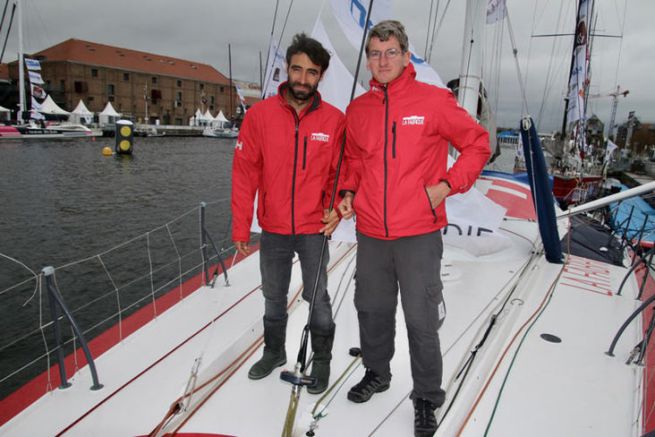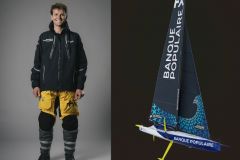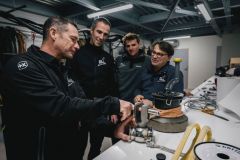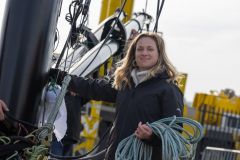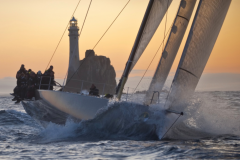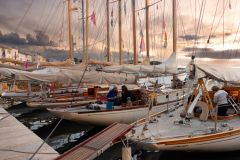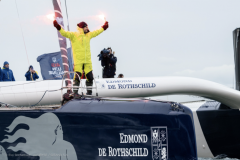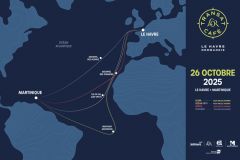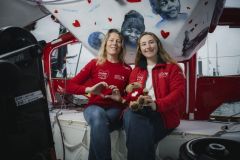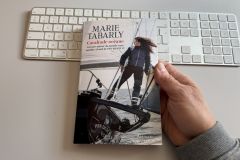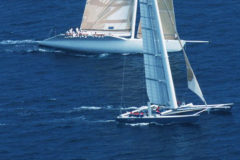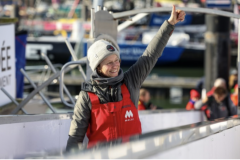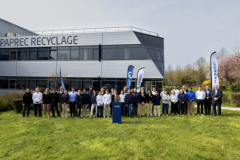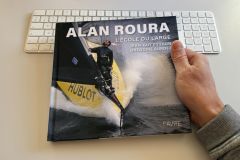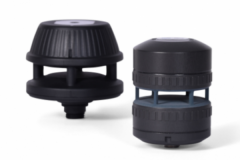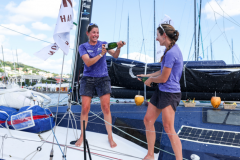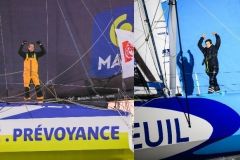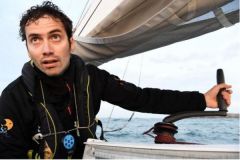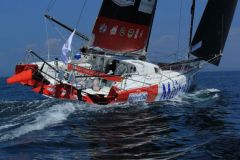What brought you together on this race?
Alan Roura: His offshore experience is impressive. In terms of ranking there is no picture. In terms of personality, there is no picture either. He is a simple, humble, kind and pleasant person to live with. This is very important. But in the end, we don't choose a "co-skipper", we choose a "skipper". There is no "co". We're two at the same level, we're running an errand together.
Frédéric Denis: We came up with the same idea. We have the same vision of things. For me there was no hesitation when he proposed to me. On the other hand, there was a time of assimilation. By the time it goes up to the brain. But in the end it didn't take long. It's a great experience. We're going to have a crazy adventure. Besides, we're going to the warmth so that's good. It's getting cold and humid in here. It's time to get out of here.
Had you sailed together before this race?
Frédéric Denis: We ran against each other, but never together on the same boat. We met via the Classe Mini. Alan did it in 2013 and I did it in 2015. The Minist group is like a big family. We ran the mini Fastnet against each other.
Alan Roura: We had a lot of friends in common so we met, we were acquaintances before we started. Then we "got closer" as time went on. The mayonnaise took right away.
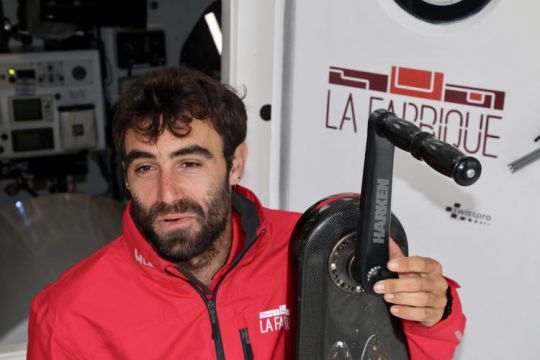
On this Jacques Vabre, what is your objective?
Alan Roura: We already have the same one: Go to the other side!
Frédéric Denis: Yes, you have to cross over. The boat is young in the team. It's already a great success to be able to align with the Jacques Vabre. After that, we're two sailors, so once on the water, we're here to give it all we've got. We'll see, we're not getting into predictions. We're here to do our best. The boat has the potential to make a good result. But on the set, there are a lot of people who know their boat much better.
Alan Roura: We don't get too involved, we're going to fight against the boats of our generation: drifting boats. The idea is to make a podium of this generation.
Alan, can you tell us about your new boat?
Alan Roura: Since the Vendée Globe, we've changed. Otherwise we would have made a general podium of course, it would have been too easy! Before that it was Super Bigou, a 2000 boat. We put this boat back in the water 3 months ago, it is Bertrand de Broc's boat: MACSF which has been sailing around the world. The idea was to get it early so you could sail. In doubles on the Jacques Vabre, it's a great experience to push the machine.
It's a good box, a good hull. The keel, mast and the whole boat are fine. It's a boat that's always worked well. Even if he never won, he was always in the game. It was also the only one left for sale with outrigger at that time. I wanted a "tuna boat" rig. So that plus that and that, so when you look at what's on the market, you end up with what's left. But actually I've always liked this boat. It is a boat that has always pleased me with its aesthetics and performance.
And then of course there is the budget side. It contributes to the final choice.
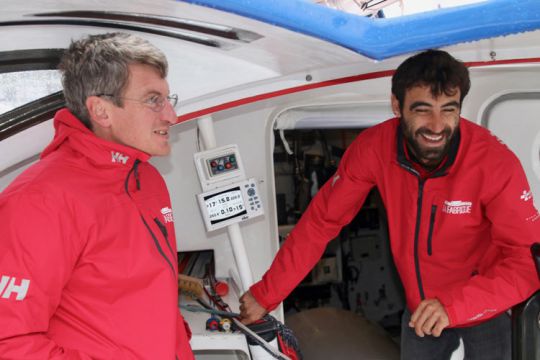
Have you made the boat evolve since the purchase?
Frédéric Denis: it is above all a refresher course. We took it as it is, we made some changes, but minimal. But the idea is to discover it and take the time to reflect on developments. Alan's luck is to have visibility until the next Vendée Globe in 2020. In 3 months, we couldn't revolutionize the boat so for the moment we have put everything back to normal, square and made some small changes. Now we have opened the specifications for the next step. The objective: to better put it in Alan's hands and make it evolve into performance.
You have plans to add foils on this boat. What does it involve?
Alan Roura: I have never sailed on a foiler before. So as far as how to navigate, we're going to have to learn again. It's really different.
The boat and its structure will undergo some modifications. We're not going to add structure, but almost remove some because it's a boat that was built very strong. There are a lot of reinforcements to be provided on the deck, like the candlesticks. The boat will go a lot faster, it will take a lot more water so there are a lot of points to modify. There are controls to be done on the keel, it is necessary to cut a part of the hull to install the foils... It's a monster case. It's 4 to 5 months of work ashore. We're going to empty the boat, there'll be nothing left inside.
We're not going to touch the hardware too much. It is not necessary to change to change, for the moment it works. We change tired parts, but if it works, we don't touch them. It is also a question of cost. It's nice to change, but at some point it's like buying a new boat! The idea is to clean it up, to optimize performance. This year, we worked hard on the pilot of the boat. Well, Fred especially..
Frédéric Denis: Yes, that's my field. I entered ocean racing with my degree in electronics engineering. I have these two hats: electronic and flying trainer.
Alan Roura: What is practical. Electronics is the navigators' pet peeve!
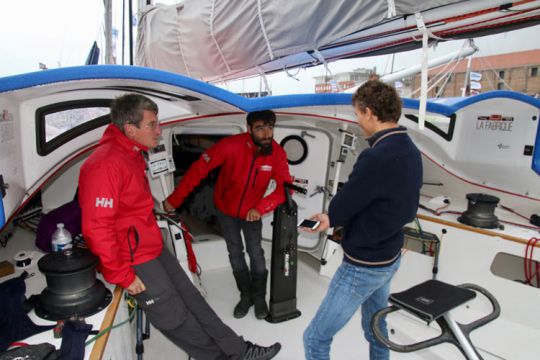
How will life on board be organised on this double-handed race?
Frédéric Denis: it's a mix between the solo sailor and the crew. In other words, there is necessarily a phase of assessment and definition of future objectives during the day. It can be during a meal, but it's not predefined. It depends on the phases of the race. We really need to identify the phases where we have to be lucid, where there are complicated manoeuvres, zones of instability, etc... And there are phases where it is straightforward, we will be able to rest and recover more. Based on all this, we will choose the time of day to take a look at ourselves, take stock and see the future. But apart from that, we're two loners who cross paths. It is necessary to optimize the rest. You shouldn't both be on deck if the conditions don't require it to have the batteries full when the boat needs them.
Alan Roura: Fred likes routing and weather. He knows that really well. I have a Vendée Globe behind me, but not with different systems, not the same files, etc... So it's true that I'm going to rely on him on this domain, but each time decisions are taken in consultation. Every decision on the boat, we make them together.
Frédéric Denis: this is the strength of our duo. Very quickly while sailing we found our place, we didn't have to consult each other. Alan is really comfortable with the state of health of the boat, the hardware checks, the sails and of course he goes around. And I'm going to be able to get the material for decision-making: to get enough to run a routing. But in the end, the decision making is always done by both of us.
Can you introduce us to the boat?
Alan Roura: For the moment, the particularity of this boat is that we are one of the only ones that floats! The others are stealing. Otherwise he has nothing specific, he has nothing more than the others.
Frédéric Denis: this is the only Finot plan in the race. It is very reliable. At the structural level, he has never had any problems. We can go into the rough weather with it, not be afraid to shoot it. He was well born.
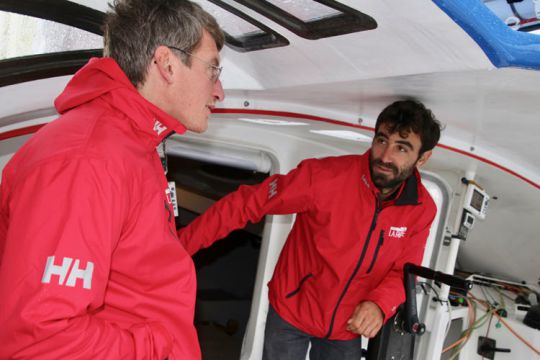
What is the program after the race?
Frédéric Denis: I have a Vendée Globe project in 2024. Doing a Transat Jacques Vabre is the best training and the best visibility for my future projects. It is by creating an experience and seeing how it works that you learn. We meet people. But I'm in the early stages. I'm looking for a sponsor, I'm building relationships. It is an environment where you have to create a network, to get people talking about themselves. You have to be active to create the opportunity. It is still a fairly large budget. But it's very interesting, there are a lot of companies that have been there for some time and are staying there. There is a communication plan that is very effective with sailing.
Alan Roura: For me the program until 2020: to participate in all the races. The idea is to do the Route du Rhum next year, then the Transat Jacques Vabre 2019 and the Vendée Globe 2020. We'll see if we have the budget for a Barcelona World Race. The race is interesting, but it costs a blindfold. It's a long way from here and there's the Route du Rhum, which ends at the same time as the start of Barcelona. I favoured rum. It's a race that's close to my heart. Like many sailors, I haven't finished it yet. Some have tried it dozens of times without success. I really want to do this. So the programme is very busy if we add the pre-season regattas that take place in Brittany and that allow us to align ourselves with other IMOCAs.
